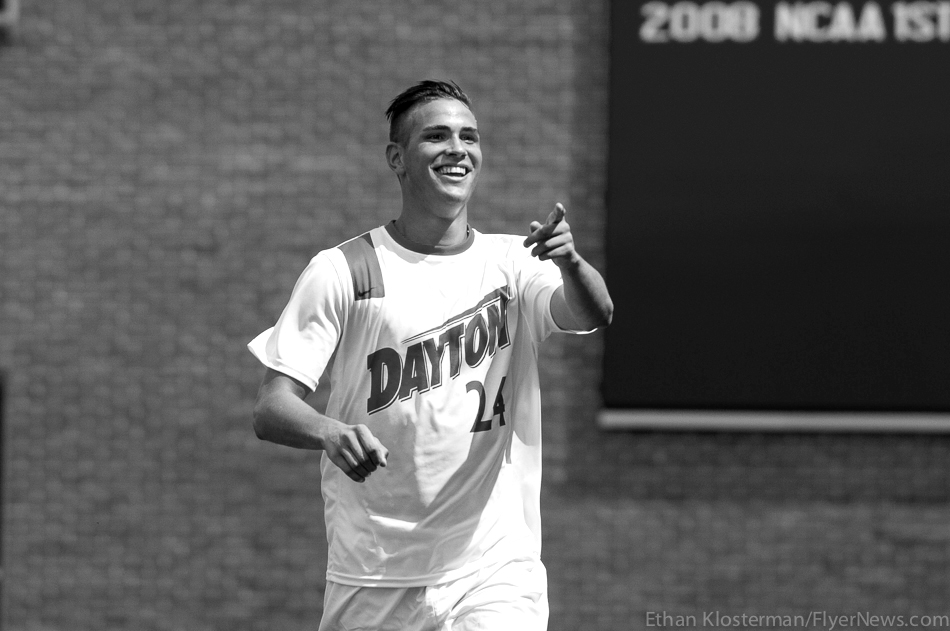Dutch soccer tradition takes root in Dayton
 University of Dayton sophomore midfielder Maik Schoonderwoerd (24) cheers after a goal during a game against Lipscomb University, Sunday, Sept. 8, 2013, at Baujan Field in Dayton, Ohio. UD won 2-0. (Ethan Klosterman/Photo Editor)
University of Dayton sophomore midfielder Maik Schoonderwoerd (24) cheers after a goal during a game against Lipscomb University, Sunday, Sept. 8, 2013, at Baujan Field in Dayton, Ohio. UD won 2-0. (Ethan Klosterman/Photo Editor)
By: DANIEL MASSA – Staff Writer
When sophomore midfielder Maik Schoonderwoerd arrived in Dayton, Ohio from his home in the Netherlands to play soccer for the University of Dayton, he expected to lose touch with the unique style of play utilized in Holland.
When the Flyers hosted a local professional team, the Dayton Dutch Lions, for an exhibition on Tuesday, April 15, Schoonderwoerd experienced a homecoming of sorts on American soil.
Since their inaugural season in 2010, the Dutch Lions of the United Soccer League’s Professional Division have brought Holland’s unique style of play to the United States and it was on full display against the Flyers.
“It was definitely a little bit different,” Schoonderwoerd said. “Normally the teams in America play in a 4-4-2 formation but they played a 4-3-3 formation, which is normal in the Netherlands.”
While Holland is technically a province within the Netherlands, in popular speech, the two are used interchangeably to describe the Dutch country.
While most of the soccer world plays a more wide-open game with long aerial passes, the Dutch style of play features more possession and steady movement up the field. Although an unpopular playing style on this side of the globe, Dutch teams and players have found success on an international level.
Holland reached the 2010 World Cup Final, falling to Spain 1-0, and one of the world’s best players, Manchester United star Robin van Persie, is Dutch.
Even though the match at Baujan Field ended in a 0-0 draw, Schoonderwoerd took a lot of positives from the experience. After all, the Flyers tied a professional team.
“We did a good job, and overall we actually out possessed them, so I’m excited for next year,” he said.
UD finished up their exhibition season Sunday, April 20, with a 1-1 draw at the University of Kentucky.
The Dutch Lions are not just Dutch in name and playing style; its whole coaching staff hails from Holland. Head Coach Sid van Druenen has more than 20 years of soccer experience in his native Holland and in Portugal, both playing and coaching.
“This year for the first time we don’t have any Dutch players,” Van Druenen said.
However, the legacy of Dutch soccer still saturates the club.
On Wednesday, April 16, the Dutch Lions announced the signing of 21-year-old Jesjua Angoy-Cruyff, whose grandfather, Johan Cruyff, is considered one of the best Dutch players of all time. While Angoy-Cruyff was born and raised in Spain, and identifies himself as a Spaniard, the signing is meaningful to the Dutch Lions’ tradition.
Angoy-Cruyff joined the team shortly afterward and appeared as a substitute in a 1-0 victory over the Harrisburg City Islanders on Saturday, April 19.
The establishment of a youth academy molded on the globally praised Dutch training tradition has contributed to a stable organizational structure.
“It is one big orange family, as we like to call it,” Van Druenen said, referring to Holland’s unofficial national color.
According to Schoonderwoerd, Dutch training techniques are quite different than the ones here in America.
“In the Netherlands they really try to develop players while they are young, while here winning is the most important thing,” Schoonderwoerd said. “Winning becomes important when you get older, not when you are 13 or 14.”
Zachary Sanford, a professor at UD, who teaches a course on the business of soccer, said he sees a unique opportunity for the Dutch Lions to develop a respectable following in a market not usually known to support soccer, especially if the team can build its own stadium.
Currently the Dutch Lions play at a complex on the campus of Beavercreek High School, and are set to move to a similar spot at West Carrollton High School in May.
“The potential to develop a new soccer-specific stadium in the future could cement the team as a fixture in the Dayton sports market and help them to further build a loyal and passionate fan base,” Sanford said.
Recently, the Dutch Lions have benefitted from two unique partnerships with teams in more established leagues than the USL.
It can be said that both are close to home, even though the teams are on two different continents. One partnership is with the Columbus Crew of Major League Soccer, and the other is with FC Twente, one of the best teams historically in the Dutch Premier League, the Eredivisie.
Per the terms of an agreement signed in 2013, which took effect last month, the Crew are required to send at least four players to the Dutch Lions in order to provide them more playing time than they might see in Columbus. The first group of players arrived in March. Among the five was striker Ryan Finley, who was drafted ninth overall in the 2013 MLS draft.
The partnership with FC Twente is based on the sharing of development strategies to be used in the Dutch Lions’ Youth Academy.
Having the Dutch Lions in Dayton gives college students and local soccer fans an opportunity to learn more about professional soccer.
“I would like to see [soccer fans] out there, to see the difference between professional soccer and college soccer,” Van Druenen said. “The quality of play is high.”
The Dutch Lions take on the Richmond Kickers at Beavercreek High school Saturday, April 26, in the team’s next home match.

